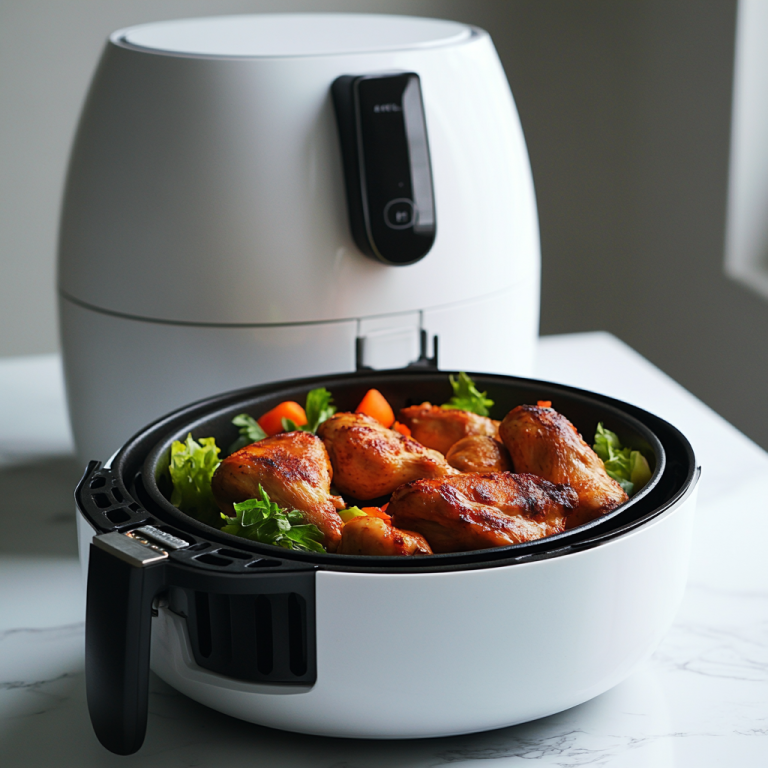Intermittent Fasting Air Fryer Meals: Quick And Healthy Options
Intermittent fasting has gained popularity as an effective approach to weight loss and overall health. But how can you make the most of this eating pattern?
Enter the air fryer—a kitchen appliance that allows you to whip up delicious, healthier meals with minimal effort. This article explores what intermittent fasting is, its benefits, and how to integrate tasty air fryer recipes into your fasting routine.
Additionally, tips will be shared to navigate potential challenges, ensuring your journey is enjoyable and successful. Get ready to discover a flavorful way to enhance your intermittent fasting experience!
Understanding Intermittent Fasting
Intermittent fasting is a dietary strategy that involves alternating periods of eating and fasting, with the objective of enhancing weight loss and promoting a healthy lifestyle. This approach can have a significant impact on body composition, energy levels, and overall nutritional intake.
By prioritising meal timing, individuals are encouraged to consider various forms of intermittent fasting, such as the 16/8 method or alternate-day fasting. These methods can be integrated seamlessly into daily routines, thereby optimising nutritional efficiency and enhancing overall meal satisfaction.
What is Intermittent Fasting?
Intermittent fasting is characterised as an eating pattern that alternates between periods of fasting and eating, thereby promoting clean eating and mindful meal timing. This method encourages individuals to limit their calorie intake to specific intervals, fostering a deeper understanding of hunger cues and overall dietary habits.
By adhering to various protocols, such as the 16/8 method or the 5:2 approach, practitioners can experience a range of benefits associated with fasting, including effective weight management and improved metabolic health. These structured eating schedules assist in regulating insulin levels, which may enhance fat oxidation.
Moreover, adopting intermittent fasting often leads to more intentional food choices, which aligns with the principles of clean eating. As a result, this approach not only helps individuals cultivate healthier relationships with their meals but also promotes overall health outcomes, encouraging mindful and balanced nutrition.
Benefits of Intermittent Fasting
The benefits of intermittent fasting are extensive, encompassing significant weight loss, enhanced metabolic health, and improved mental clarity. Many individuals report increased energy levels and heightened focus during fasting periods, which can lead to noteworthy improvements in dietary habits.
By following a structured eating schedule, individuals are able to achieve balanced nutrition and effectively manage their food portions.
Weight Loss and Other Health Benefits
Intermittent fasting has been demonstrated to facilitate weight loss through various mechanisms, including improved body composition and enhanced metabolic health. By promoting a healthy lifestyle and encouraging mindful eating habits, fasting can result in significant reductions in body fat and improvements in overall well-being.
This dietary approach not only encourages the body to utilise stored fat for energy but also supports the preservation of lean muscle mass. As individuals adopt intermittent fasting, they may experience improved insulin sensitivity, which is crucial for effective fat metabolism. These metabolic benefits can contribute to healthier blood sugar levels and a reduced risk of chronic diseases.
HuggieGems 4 Pack Magnetic Spice Storage Rack Organizer for Refrigerator and Oven, Black Fridge Organizers and Storage
$16.99 (as of 21:31 GMT +00:00 - More info)The structured eating pattern associated with intermittent fasting can assist individuals in developing a more positive relationship with food, enabling more conscious choices and ultimately leading to sustainable weight management. The combination of these factors makes intermittent fasting a compelling option for those seeking to achieve their weight and health objectives.
Air Fryer: A Healthy Cooking Tool
The air fryer has emerged as a transformative appliance in the realm of healthy cooking, enabling individuals to prepare meals that are both flavoursome and nutritious while minimising the use of excess oil.
By employing innovative cooking techniques, this device can achieve crispy textures while preserving essential nutrients in food, making it particularly suitable for meal preparation and clean eating.
As the popularity of air-fried meals continues to rise, it is imperative to comprehend how this appliance can be effectively incorporated into a balanced diet.
How an Air Fryer Works
An air fryer operates by circulating hot air around food, thereby creating a crispy texture akin to traditional frying methods while utilising significantly less oil. This makes it a healthier alternative for preparing quick meals. This cooking technique not only enhances cooking efficiency but also facilitates better retention of essential nutrients, making it suitable for a variety of dietary preferences.
This innovative appliance employs convection heating technology, which ensures that hot air reaches all surfaces of the food uniformly. By generating a continuous stream of heated air, it cooks meals rapidly while minimising moisture loss, resulting in foods that are pleasantly crispy on the exterior while remaining tender on the inside.
YETI Rambler 20 oz Stainless Steel Vacuum Insulated Tumbler w/MagSlider Lid
$35.00 (as of 21:31 GMT +00:00 - More info)Whether preparing vegetables, meats, or even desserts, the versatility of the air fryer positions it as an attractive option for individuals seeking to enjoy their favourite fried dishes without the associated guilt. The ease of cleaning further contributes to its appeal, allowing busy individuals to relish home-cooked flavours without unnecessary inconvenience.
Benefits of Using an Air Fryer
The advantages of utilising an air fryer extend beyond the mere elimination of oil in cooking; it also enhances culinary techniques and fosters healthier meal options. By reducing overall calorie intake and providing versatile cooking methods, the air fryer serves as a valuable addition to any kitchen, accommodating both family-oriented meals and individual dietary objectives.
This innovative appliance simplifies meal preparation, which is particularly beneficial for individuals with busy lifestyles. Whether preparing crispy vegetables, flavoursome proteins, or even baking desserts, the air fryer adapts seamlessly to various culinary requirements. It not only reduces cooking time but also minimises cleanup, making it ideal for those who prefer less post-meal tidying.
With the capability to utilise minimal to no oil, users can explore healthier alternatives while still enjoying their favourite recipes. Ultimately, the air fryer emerges as an exceptional tool for anyone seeking cooking solutions that promote nutritious eating habits.
Integrating Air Fryer Meals into Intermittent Fasting
Integrating air fryer meals into an intermittent fasting regimen can significantly enhance meal variety while supporting a balanced diet.
By utilising healthy recipes that emphasise lean proteins and nutrient-dense vegetables, individuals can prepare satisfying meals that align seamlessly with their fasting schedule.
Meal Ideas and Recipes
Air fryer recipes present a wide array of meal options that are ideal for efficient cooking, including low-carb meals and savoury dishes suitable for intermittent fasting. These recipes accommodate various dietary preferences, allowing individuals to enjoy nutritious meals without compromising flavour or convenience.
For example, one might prepare spicy garlic prawns accompanied by a fresh salad, or savour crispy air-fried chicken thighs seasoned with preferred herbs.
Vegetarian options such as courgette fries or cauliflower bites are also available, both of which are rich in flavour and low in carbohydrates.
Additionally, quick-cooking, protein-rich alternatives like turkey meatballs or air-fried salmon fillets offer an excellent source of nutrition.
These meals not only contribute to a balanced diet but also enable individuals to minimise their time spent in the kitchen without sacrificing taste or health benefits.
Tips for Successful Intermittent Fasting with Air Fryer Meals
To achieve success with intermittent fasting while incorporating air fryer meals, it is essential to implement effective meal preparation and planning strategies.
Rubbermaid Brilliance Food Storage Containers, BPA Free, Airtight Lids, Ideal for Lunch, Meal Prep & Leftovers, Set of 5 (3.2 Cup)
$37.07 (as of 21:31 GMT +00:00 - More info)By leveraging cooking efficiency and meal substitution techniques, individuals can optimise their meal times and ensure adherence to their fasting schedules without experiencing feelings of deprivation.
Planning and Preparation Tips
Effective planning and preparation are crucial for achieving success in intermittent fasting, particularly when integrating air fryer meals into one’s routine. Employing smart cooking techniques and implementing food preparation strategies can streamline mealtimes and ensure adequate hydration during fasting periods.
By dedicating a few hours each week to meal preparation, individuals can not only save time but also create delicious and nutritious meals that align with their dietary goals. Techniques such as batch cooking, which involves preparing larger quantities of food and portioning them out, can significantly reduce mealtime stress, providing quick access to well-balanced options.
Methods such as roasting, steaming, or grilling vegetables can enhance flavours while preserving essential nutrients, resulting in a satisfying culinary experience. Additionally, incorporating hydrating foods like cucumbers and watermelon into snacks ensures that the body maintains proper hydration, ultimately supporting overall health during fasting intervals.
Possible Challenges and How to Overcome Them
While intermittent fasting presents numerous benefits, individuals may face challenges such as hunger and cravings that can impede their adherence to the diet.
By employing effective dietary strategies and prioritising meal satisfaction, these challenges can be effectively managed, enabling individuals to sustain their commitment to fasting.
Owala FreeSip Insulated Stainless Steel Water Bottle with Straw for Sports and Travel, BPA-Free, 24-oz, Blue/Teal (Denim)
$27.99 (as of 21:31 GMT +00:00 - More info)Dealing with Hunger and Cravings
Managing hunger and cravings during intermittent fasting presents a considerable challenge for many individuals, particularly during the initial transition to this dietary approach. By concentrating on meal timing and ensuring nutritional adequacy during eating periods, individuals can more effectively manage their hunger and adhere to their fasting schedules.
Effective strategies may include planning meals that are high in fibre and protein, as these components promote feelings of fullness and can diminish cravings for extended periods. By opting for nutrient-dense foods that provide essential vitamins and minerals, one can attain a sense of physical and mental satisfaction.
Establishing a consistent eating window can facilitate the body’s adaptation over time, allowing individuals to more readily distinguish between genuine hunger signals and emotional or habitual cravings. Additionally, practising mindfulness during meals can enhance the overall dining experience, fostering appreciation for food while mitigating the urge to snack outside of designated eating times.

















